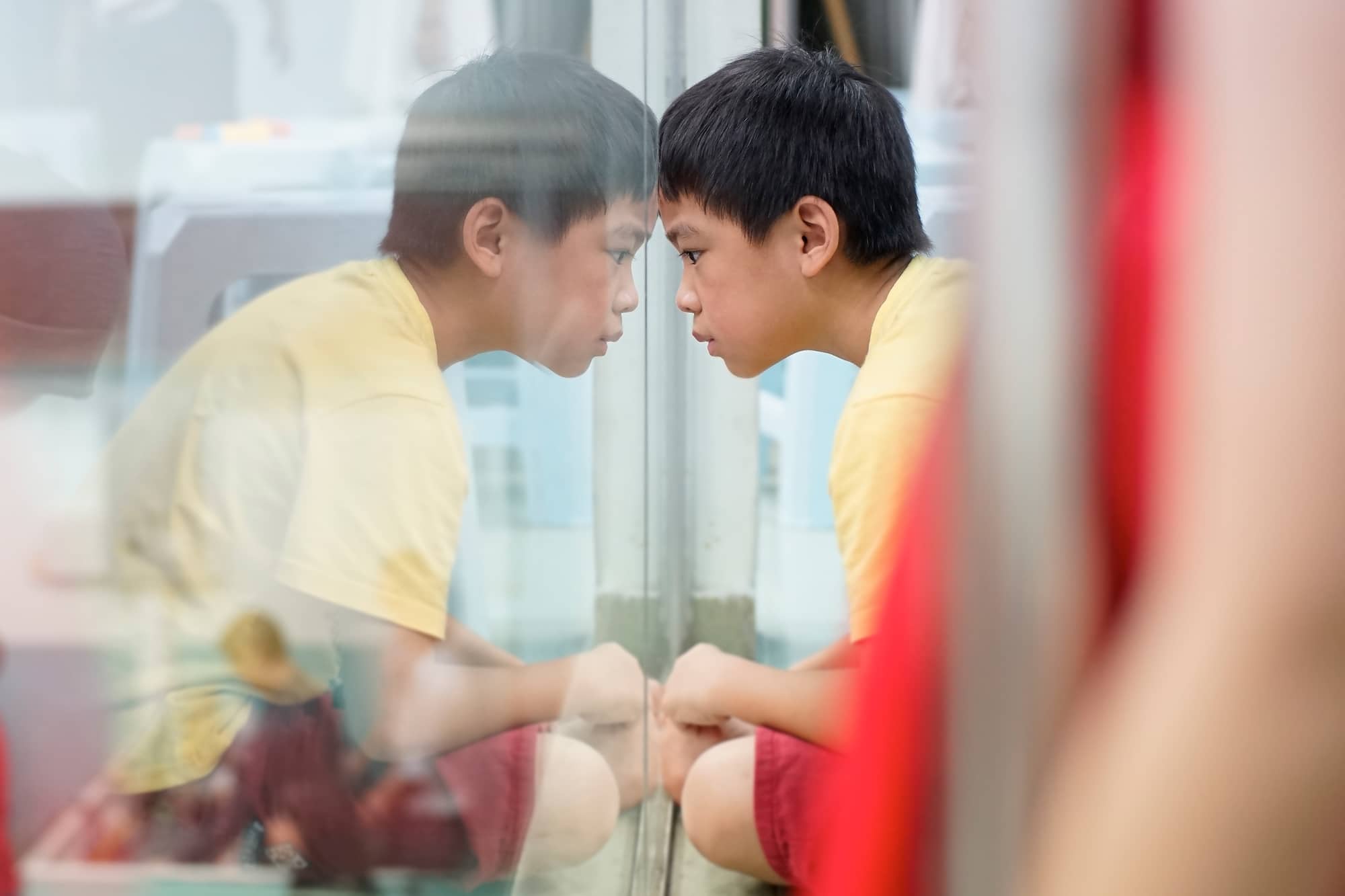How can I help my child manage their emotions? Parenting is heart work, says pastor and coach
by Gracia Chiang // August 19, 2024, 6:43 pm

At the D6 Family Ministry Conference, parents were equipped with skills to strengthen family life and pass on a spiritual legacy to their children. Photo from Depositphotos.com.
If your child’s heart is a workshop, what tools are you going to find in there?
How does your son or daughter cope with disappointment? How do they react when they are angry?
The answers to these questions can shed light on whether your child is equipped with the right tools to wrestle with these emotions.
Unpacking what it means to adopt a heart-based approach to parenting, Dr Scott Turansky, keynote speaker at the D6 Family Ministry Conference 2024, clarified how this goes beyond other approaches such as reward and punishment, which is linked to behaviour modification.
“We have to go deeper than behaviour to work in the heart of a person because that’s where emotions are. If you’re just going to try to solve emotional problems by dealing with behaviour, you will not get very far,” explained the co-founder of the US-based National Center for Biblical Parenting.

Opening the conference, Dr Scott Turansky addressed the role of parents in teaching their children about the faith on Day 1. All conference photos by Streams of Life Media.
“If you think about the heart as a processing unit, children need to process life differently,” said Dr Turansky, who is also the co-author of Parenting is Heart Work, a book that he uses to teach and coach parents from.
Drawing inspiration from Scripture to develop tools that bring about change in children, the pastor at GraceWay Bible Church and professor at Concordia University shared a number of these strategies at the conference, which was held from July 26-27, 2024 at Paya Lebar Methodist Church.
A closer look at the heart
Taking a journey into the heart, Dr Turansky identified a few things that can be found in every person.
- Desires (Psalm 37:4, Matthew 6:21): “I want”
- Emotions (Matthew 22:37, John 14:1, Proverbs 12:25) : “I feel”
- Beliefs (Romans 10:9-10): “I believe”
Showing how these are intertwined, he said that when a child’s desires are strong, these can turn into expectations, which can become demands. When these demands are not met, the child develops an emotional response (e.g. anger or disappointment).
Wrong beliefs can also exacerbate the problem. For instance, “My mum should not be able to tell me to get off the video game until I’m finished with this next level,” or “I”m a kid, and my job in life is to have fun.”

What’s inside the heart? On Day 2, Dr Turansky showed how desires, emotions and beliefs can affect the way a person thinks and acts.
In the example of a child who struggles with a pattern of angry responses, Dr Turansky observed: “Many of these children with anger problems have black and white thinking: ‘You’re wrong, and if you’re wrong, I can have the right to be angry about this thing.’
“What we’re trying to do is we’re trying to help children become more emotionally flexible: ‘I don’t have to have it my way. I don’t have to balance the scales of justice.”
In other words, we are trying to change tendencies and build new patterns within a child’s heart.
Emotions are not bad
Focusing on the topic of self-regulation in one of his workshops, Dr Turansky believes that every child must have a plan to deal with three big emotions: anger, sadness and anxiety.
“Emotions aren’t bad – they just need to be controlled,” shared Dr Turansky, adding that emotions are fundamentally good.
“God created us as emotional beings,” he said. “We all have emotions, and it’s part of God’s creation. Now the fall (of man) corrupts those things, so we must understand where the line is.”
For example, anger is like a flashing light on the dashboard, warning us that something is wrong and we need to do something about it.
“Anger is good for identifying problems, but not good for solving them,” he emphasised.
“Because when you solve problems with anger, that’s when people get hurt, things get damaged and so on.”
Elaborating that sadness can also often be mingled with anger, Dr Turansky noted that when a child experiences disappointment (“I don’t get what I want”), this can trigger an angry outburst.

In his workshop on regulating emotions, Dr Turansky identified several common mistakes that parents make when trying to help their children.
Illustrating what goes on within the hearts of some children who are overwhelmed, he likened this process to an internal cyclone that spins out of control.
“They just wrap themselves up. They go from 0 to 60 in a matter of seconds,” he described.
“It’s very dramatic. So what we’re trying to do is help children know how to manage the cyclonic thinking in ways that are most effective.”
When a parent says “no”, their child might take out the arguing, badgering, or the whining and complaining tool, said Dr Turansky.
Since every child needs to hear the word “no” at some point, they have to go into the workshop of their heart and figure out how they are going to respond to that boundary.
“We have to give them new tools to work on inside their hearts.”
How can parents handle challenging behaviours?
For parents who are navigating emotional challenges with their children, here are some tools proposed by Dr Turansky.
1. Practise responsiveness
Does your child come when called?
For a child who always wants their own way, this exercise is great for instilling responsiveness. Because when a child comes, it requires them to leave something behind.
“When we teach responsiveness to children now, we’re teaching them how to manage ‘letting it go’,” he explained.
This is helpful for a child who has a problem with anger, sadness or anxiety because part of the solution lies in learning to let go of these emotions.
When you call a child’s name, he or she needs to come to you and say: “What mum?” or “What dad?”
Or better yet: “Yes, mum,” or “Yes, dad”. Because there is a tendency inside the heart that is already saying, ‘No, I don’t want to do this.'”

The practice of getting your child to come when called can be done regardless of whether your child is a toddler or teen. Photo from Depositphotos.com.
Once the child comes, you give the assignment: “You need to…”. The reason why those words are important is because we are training the conscience, said Dr Turansky.
Equally important is also the way the instruction is phrased – it should not sound like an idea or a question.
This builds the sense of obligation in the child (“I need to”). Over time, that can also help with rising above urges (“I want to”) and developing self-control.
Finally, telling your child to report back is a good way to round up the instruction routine.
“Because when they report back and that job is done, you’re looking at them and saying, ‘Good job. Well done, good and faithful servant. You don’t have to use those words, but it’s the same idea.”
2. Take a break
This is something that Dr Turansky recommends when your child is “off track”, meaning he or she is reacting to big emotions such as anger, anxiety and disappointment.
This can show up in different forms, e.g. disrespect, defiance, meanness, yelling, sarcasm or being uncooperative.
Comparing this to a train that has been derailed, Dr Turansky said the solution is “to get back on track before we can go forward”.
When a child is upset, this often makes a parent upset too, which then gets the child even more upset. Similarly, when a child gets angry, he or she tends to feel like pushing forward to solve this problem with anger.
To stop this escalation of emotion, the parent can say: “Looks like we need a break.”
“We’re going to pull back. We’re not going to allow this continued feeding of this problem inside of a child,” said Dr Turansky.

When emotions are spiralling out of control in a child, continuing to engage might not be helpful. Photo from Depositphotos.com.
This is different from a timeout when you punish a child by keeping him or her in a place for a set time.
Instead, Dr Turansky suggests the following words: “You need to go take a break, change your heart, settle down, and come back and see me when you’re ready.”
This can also overcome one of the mistakes that he sees parents making in such situations – talking too much.
When a child is arguing, continuing to dialog only serves to validate poor interaction, he said.
The parent might want to say something like: “What you’re doing now is not right. You can’t treat me that way,” or “I can’t talk to you right now because you’re yelling at me.”
The child then has to learn how to take a break, which is an adult skill that we too need to learn, added Dr Turansky.
3. Use the positive conclusion
At the end of a correction or discipline cycle, Dr Turansky advises uses three questions and one statement.
- What did you do wrong? This is usually related to a behaviour, e..g. “I hit my brother.” Phrased this way, it also gives an opportunity for confession.
- Why was that wrong? This typically addresses something in the heart. e.g. “I was not being kind or patient.”
- What are you going to do differently next time? Here, you are helping a child imagine what they are going to do when the same trigger happens.
- Okay, go ahead and try again. This conscience-freeing statement is meant to help your child move on. By saying this, you are also offering your child another chance to practise doing the right thing.
Explaining that this technique was developed based on what he observed in the Bible, Dr Turansky said: “God’s word for ‘change’ in a person is repentance.
“What does God say that we need to do when we’ve done the wrong thing? We need to confess it.”
“God’s word for ‘change’ in a person is repentance.”
Asking questions such as “Who started it?” or “Why did you do it?” ends up fostering defensiveness instead, he observed. Instead, we want a child to reflect and then repent.
“Repentance is not just stopping going forward. It’s a 180-degree turn. Now we’re going to go the other direction,” he said.
By giving them a chance to do right the next time, it is almost like Jesus saying to the woman who was caught in adultery, go and sin no more (John 8:11).
4. Transfer responsibility
Another principle that Dr Turansky advocates is helping a child take ownership of their thoughts and actions.
“They have the responsibility to be able to manage this challenge, and we’re just going to come alongside and help them do it,” he said.
A key element of this involves coaching children to come up with a plan to manage their uncomfortable emotions.
For example, a parent could ask their child to list down three to five things that they can say to themselves and do instead of reacting in anger. Here are a few suggestions:
- “I’m trying to grow out of this anger in my life and be more mature, so I’m going to settle down more quickly.”
- “It’s not worth it for me to get all upset.”
- “I need to let it go.”
- “I’m just going to step back.”
- “I’m going to get a drink of water.”
5. Intentionally treat children uniquely
The idea is to gradually change the belief that some children have regarding fairness.
When children think that fair means equal, the constant comparison and competition with others can lead to a justice mentality that sparks anger.
“It’s very important to intentionally treat children special and uniquely, and not treat them the same,” said Dr Turansky, demonstrating how the Bible shows us that God, too, treats His children uniquely.
For example, in the Parable of the Talents (Matthew 25:14-30), or when Jesus tells Peter what will happen to him at the end of his life (John 21:18-22).

Sibling rivalry may be natural, but there are ways to discourage comparison and competition within the family. Photo from Depositphotos.com.
Help children understand that they will be given what they need, but not necessarily the same thing as others, he added.
This could sound like: “Don’t worry about your sister. You worry about you,” or “Your brother needs shoes, but you do not.”
6. Teach honour and contribution
“Honour is one of the qualities that children need to learn – it helps them to get off their self-focused tendencies,” said Dr Turansky.
This is especially helpful for tackling emotions such as disappointment, which arises because a child does not get what he or she wants.
The goal is to move children from being self-focused to others-focused.
To do this, he suggests giving children tasks around the house, i.e. “honour missions” or “honour checks”.
For example, asking a child to play with his brother for five minutes, or to go into the living room and see what needs to be fixed.
“We must have a mission-oriented view of life.”
Closely related to this is the idea of guiding children to see themselves as “contributors” to life.
Children need to learn that “it is not not all about me”, said Dr Turansky. “God has given (them) a mission to contribute to other people’s lives.”
Even just small tweaks in the kind of questions and statements we give to our children can make a difference.
- “Did you have fun?” vs “Did you help anyone today?”
- “Have fun!” vs “Take care of your brother. Do the right thing!”
“We must have a mission-oriented view of life,” he said, pointing out that many parents make the mistake of prioritising pleasure in their home.
“Pleasure is not your goal. Pleasure is a byproduct of a mission-oriented view of life.”
7. Develop gratitude
Calling this “gratefulness therapy”, Dr Turansky shared that when children think about the things they already have instead of complaining about what they do not have, this exercise can alleviate emotions such as sadness, bitterness and resentment.
Quoting Philippians 4:6, he also highlighted that “thanksgiving” is one of the tools that the Bible talks about when addressing anxiety.
“If we have a grateful heart, then (it) doesn’t focus on the bad things that could happen; we’re focusing on the good things that God has already given,” said Dr Turansky.
Parents could get their child to start a gratitude journal, he suggested.
Don’t forget to build the relationship
Finally, while having tools is good, undergirding all of this has to be the relationship between parent and child.
Going back to what is inside our hearts, Dr Turansky pointed out that aside from desires, emotions and beliefs, we also have the ability to connect with another person.
“When we have a relationship with another person, one heart opens to another heart, and then we can pass the values on to that other person,” he said.
“When you build relationship, you’re opening the pathways for the things you’re going to do, for the things you’re going to teach.”

If parents want to be able to speak into the lives of their children, investing time into building a strong relationship is key. Photo from Depositphotos.com.
Ultimately, the greatest pathway is also the one that goes to our Heavenly Father, declared Dr Turansky.
When we encourage children to open up their hearts and accept Jesus Christ, the Holy Spirit comes to live in them and God can speak to them through Scripture and other means.
Urging parents to think of a heart-based approach as a way to develop character in their children, Dr Turansky asserted that it should lead to a change in how their children think and act.
Echoing the words of the psalmist, this is what he hopes to see – God working on both the inside and outside of a person.
May these words of my mouth and this meditation of my heart be pleasing in your sight, LORD, my Rock and my Redeemer. (Psalm 19:14)
Dr Turansky summarised: “A heart-based approach is so strategic because it changes us in some very powerful ways.”
D6 is a yearly family ministry conference that focuses on generational discipleship in churches and homes. Registration is open for next year’s D6 conference, which will be held on July 25-26, 2025. Special rates are available for individuals and groups from now until December 31, 2024. For more details, do visit biblesociety.sg/registration.
READ MORE:
We are an independent, non-profit organisation that relies on the generosity of our readers, such as yourself, to continue serving the kingdom. Every dollar donated goes directly back into our editorial coverage.
Would you consider partnering with us in our kingdom work by supporting us financially, either as a one-off donation, or a recurring pledge?
Support Salt&Light


